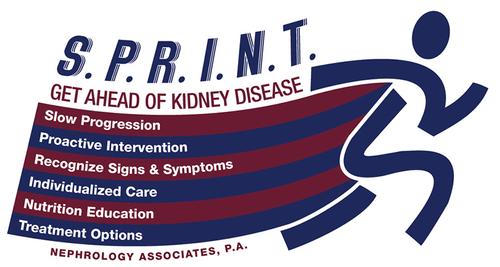 Welcome to Nephrology Associates’ S.P.R.I.N.T. Program. The doctors and nurses developed this program specifically for our patients with Chronic Kidney Disease. Our goal is to slow the progression of damage to the kidneys, and to treat the associated complications. These include hypertension, anemia, and bone disease. If we are unable to arrest the disease process, and the kidney damage progresses to end stage renal disease (ESRD), our plan is to manage these complications while preparing the patient for renal (kidney) replacement therapy. This therapy may consist of hemodialysis, peritoneal dialysis, or kidney transplantation.
Welcome to Nephrology Associates’ S.P.R.I.N.T. Program. The doctors and nurses developed this program specifically for our patients with Chronic Kidney Disease. Our goal is to slow the progression of damage to the kidneys, and to treat the associated complications. These include hypertension, anemia, and bone disease. If we are unable to arrest the disease process, and the kidney damage progresses to end stage renal disease (ESRD), our plan is to manage these complications while preparing the patient for renal (kidney) replacement therapy. This therapy may consist of hemodialysis, peritoneal dialysis, or kidney transplantation.
Managing these complications and preparing patients for renal replacement therapy is a complex process of visits, treatment, and teaching sessions. Patients interact with our team which includes nephrologists (kidney doctors), nurse practitioners, registered nurses, medical assistants, a renal care coordinator, and a renal dietician.
Slowing Progression
- Keep blood pressure controlled (<130/80). Your doctor may specify a different target based on your condition.
- Take certain types of medication called ACE-Inhibitors or Angiotensin Receptor Blockers.
- For diabetics, keep blood sugars under control, with HbA1c less than 7.0. This requires frequent monitoring of your blood sugars.
- Avoid medication that will damage your kidneys, such as non-steroidal anti-inflammatory drugs (NSAIDS). Examples are ibuprofen, Advil, Motrin, Aleve, Celebrex and Naprosyn. Tylenol may be used.
- Avoid oral sodium phosphate as liquid or tablet. Example: Visicol®, OsmoPrep®, Fleet®.
- Avoid, if possible, IV contrast used for CT scans and heart catheterizations.
Proactive Intervention
- Controlling your cholesterol.
- Quitting smoking.
- If overweight, losing weight.
- Treating anemia, if present.
- Treating acidosis, if present.
- Treating elevated uric acid, if present.
Recognizing Symptoms
- Often no symptoms in the earlier stages (I-Ill)
- Feeling tired or weak
- Headaches
- Itching
- Nausea and vomiting
- Loss of appetite
- Swelling
- Shortness of breath
- A metallic taste in your mouth
- Darkening of the skin
- Trouble concentrating
- Change in urination
Individualized Care
Patients who are enrolled in the S.P.R.I.N.T. program will review their lab results with their doctor and/or nurse practitioner at each visit. We go over the goals, where you are and what we can do help you reach these goals. We will work with you to determine the best treatment plan as we go forward.
CKD GOALS:
eGFR stabilize or slow rate of decrease
BP less than 130/80
Urine Protein/Creatinine stable or ↓
Urine Microalbumin/Creatinine stable or ↓
Anemia <1 or lower
Anemia
Hemoglobin greater than 10
Iron Saturation greater than 20%
Ferritin greater than 100
Bone Disease
Calcium 8.4 - 10.2
Phosphorus 2.7 - 4.6
PTH
Stage III 35 - 70
Stage IV 70 - 110
Stage V 150 - 300
CO2 greater than 22
Uric Acid less than 8.0
Albumin greater than 3.8
HbA1C less than 7.0
LDL less than 100
Total Cholesterol less than 200
HDL greater than 45
BMI less than 25 or ↓
Nutrition Education
Our multi-disciplinary team will provide you with a diet specific to your needs. There is no such thing as a special kidney diet for everyone. A diet for patients with Chronic Kidney Disease may consist of monitoring fluid intake and low amounts of potassium, phosphorus, and sodium. Healthy cholesterol and blood sugar levels are also very important. Some patients may need to adjust the amount of protein in their diet as well. Simple blood and urine tests will be ordered on a regular basis to monitor the levels of potassium, phosphorus, sodium, cholesterol, and protein in your body.
Treatment Options
As kidney disease progresses through its five stages (based on the degree of damage to the kidneys), different diagnostic studies, treatments, and teaching sessions will take place.
Education and planning is key to successfully managing this disease. We will schedule visits solely focused on education to learn about hemodialysis and kidney transplant. We offer free group classes (TOPs) conveniently scheduled twice a month. You and your family are welcome to attend. We will closely monitor how you are feeling, along with monitoring your labs, to adjust your treatment accordingly.
We hope you will help us by keeping appointments, following treatment
recommendations, asking questions and fully participating in this effort.
